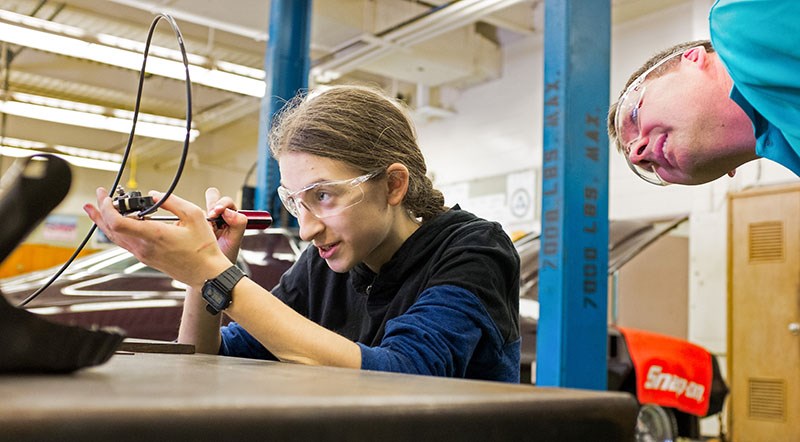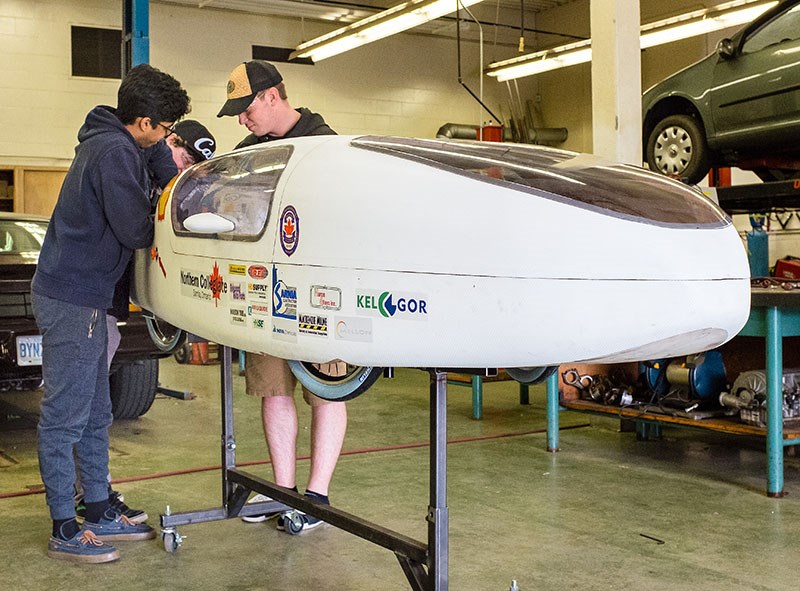Troy Shantz
The world of transportation is changing and a group of industrious students from Northern Collegiate are at the forefront.
Fourteen teens with a mishmash of skills have put together a light, futuristic and fuel-efficient vehicle they call Rover.
This weekend, Rover will hit the track in Detroit at the Shell Eco-marathon Americas (SEMA), an annual event devoted to finding the most fuel-efficient vehicle.
Northern is the only Canadian high school headed to Detroit. The other 19 Canadian teams all hail from universities and colleges.
“Kids can do great things if they have the chance and the support,” said Northern staff member Doug McArthur.
Over the past three months the students have taken over the school’s design and technology wing to work on their vehicle in a flurry of sparks, dust and keystrokes.
On any given night, one student might generate CAD drawings while another welds and another, using GPS, calculates how Rover’s engine must operate on the track for optimum performance.
For the most part, faculty consults only from the sidelines and the students manage even the project’s finances and promotion, McArthur said.
“The kids go out to the community, talk to community partners, obviously ask them for money and if they want to support the project,” he said.
They also lobby for supplies and expertise, and city fabricator Kel-Gor Limited responded by sending a welder over to help.
Behind the wheel is twelfth grader Maria Peregoudov, who also manages the steering and brake assemblies on Rover.
“I think it was just who weighs the right amount and who’s tall enough,” she said with a laugh.
Peregoudov’s background in Air Cadets was also a factor, McArthur said.
“She wants to be a pilot, so if she can fly a plane she can fly this.”
This is Northern’s second year at the competition, which attracts students from seven countries.
The biggest addition to Rover this year is fuel injection system. Team members rig it up to a laptop so they can tinker with compression ratios and RPMs on Rover’s power plant — a 160cc lawnmower engine.
Last year their vehicle achieved 352 miles per gallon in the gasoline prototype category, a field in which some entrants didn’t finish a lap.
Students had to apply for their spot on the team and spent 10 to 30 hours a week on the project.
Eleventh-grader Afnan Shaikh said juggling homework and Rover has made him an expert time manager.
“It’s nice, because I’m never bored now,” he said.
The team is younger this year because many of last year’s squad graduated and joined Eco-marathon teams at the university level.
Northern grad Jordon Fewster just completed his first year at the University of Windsor. He came back the day his classes ended to check on the team’s progress.
Fewster, who participates on his university Eco-marathon team, maintains close ties with his former high school.
Northern’s community support and resources is a rare asset in the competition, he said.
“When we go there we’re representing Northern, we’re representing Sarnia,” he said.
“We want to show people that we’re from a place that isn’t just some random small town in Ontario. It’s this place where kids thrive educationally.”

